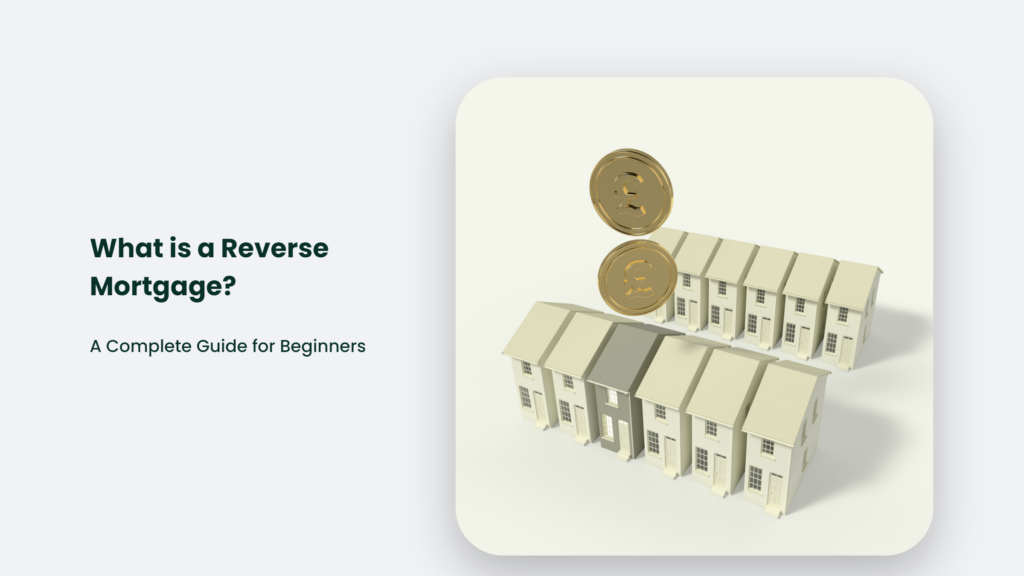Ever wondered, “What is a reverse mortgage?” Well, you’re not alone. While not as well-known as its traditional mortgage counterpart, this financial product is a powerful tool that can provide homeowners with a unique financial option.

What is a Reverse Mortgage?
A reverse mortgage is a unique type of loan that allows homeowners aged 62 and older to access the equity in their home. With a reverse mortgage, you receive funds from the lender while retaining your home’s ownership. The loan must only be repaid when you sell the home, move out permanently, or pass away.
Reverse mortgages have become an increasingly popular option for seniors looking to supplement their retirement income. But how exactly do they work? This comprehensive guide will provide an in-depth look at everything you need about reverse mortgages.
How Does a Reverse Mortgage Work?
A reverse mortgage works differently than a traditional “forward” mortgage.
With a forward mortgage, you make monthly payments to the lender to pay down your loan balance over time. The lender’s stake in your home decreases as you build equity.
Conversely, with a reverse mortgage, the lender makes payments while your loan balance rises over time. You are not required to make any monthly payments. The loan is repaid when you sell the home or pass away. At that point, any proceeds from the sale must first go towards repaying the reverse mortgage lender before any remaining equity can go to you or your heirs.
The amount you can borrow depends on your age, current interest rates, and the appraised value of your home. Generally, the older you are, the more equity you have built up, and the more valuable your home is, the more money you can access through a reverse mortgage.
Why Get a Reverse Mortgage?
There are a few key reasons a reverse mortgage may make sense:
- Supplement retirement income: The funds from a reverse mortgage can provide monthly income to help cover living expenses in retirement. It can be especially helpful for retirees struggling with a shortfall.
- Eliminate forward mortgage payments: For retirees still paying off a traditional mortgage, a reverse mortgage can be used to pay off that loan and eliminate those monthly payments entirely.
- Pay for healthcare costs: Reverse mortgage funds can help pay Medicare premiums, long-term care costs, medical bills, and more. It may allow retirees to preserve their retirement savings.
- Make home improvements: The loan proceeds can be used to make necessary repairs, install handicap-accessible features like ramps, or even remodel the home.
- Avoid liquidating assets: Retirees can tap home equity instead of being forced to sell investments or other assets to generate funds.
What Are the Requirements for a Reverse Mortgage?
While reverse mortgages don’t have income or credit score requirements, there are a few rules about who qualifies:
While reverse mortgages don’t have income or credit score requirements, there are a few rules about who qualifies:
- You must be at least 62 years old.
- You must either own your home outright or have a substantial amount of equity built up (at least 50%)
- The home must be your primary residence where you live most of the time.
The home you use for a reverse mortgage also needs to meet the lender’s standards. It must be a single-family home or a 2-4-unit property that you occupy. Condos and manufactured homes may also be eligible, depending on the lender.
How Much Does a Reverse Mortgage Cost?
Reverse mortgages come with several upfront costs you’ll need to pay, including:
- Origination fee – up to $6,000
- Upfront mortgage insurance premium – 2% of the home’s value
- Third-party closing costs (appraisal, title search, etc.)
- Ongoing mortgage insurance premiums
- Interest on the loan
These costs mean that reverse mortgages can be more expensive than other options like home equity loans or lines of credit. Shop around between lenders to find the best rates.
HUD now requires lenders to provide borrowers with a Total Annual Loan Cost (TALC) estimate. It shows the projected average annual costs of the loan based on your life expectancy, so it’s easier to compare offers.
What Are the Different Ways to Receive Funds?
There are a few different options for how you can receive your reverse mortgage proceeds:
- Lump sum: Get the entire amount you qualify for at closing as a single payment. It provides maximum funds upfront, but less remains available later as you draw down your equity.
- Tenure payments: Receive equal monthly payments for as long as you live in the home. It provides a steady income stream.
- Term payments: Get monthly instalments for a fixed period of the months you select.
- Line of credit: Access a revolving account to draw down as needed. It offers flexibility, but interest applies to any unused credit.
- Combination: You can mix and match payment options depending on your needs. For example, you could take half the funds as a lump sum, establish a line of credit, and set up tenure payments.
Are Reverse Mortgages Risky? What to Watch Out For
Reverse mortgages can be beneficial if used carefully, but they do come with some risks to be aware of.
- You may use up all your home equity over time, leaving nothing left for you or your heirs later.
- Falling home values could leave you owing more than the house is worth if you need to sell.
- Origination fees and ongoing costs make reverse mortgages expensive.
- Predatory lenders may push seniors into unsuitable loans.
To avoid problems, have an independent advisor review the loan terms first. Only borrow what you reasonably expect to need, build in a buffer for home value fluctuations, and look for a lender that offers counselling before signing up.
Alternatives to Reverse Mortgages
Before committing to a reverse mortgage, also consider if other options may better suit your needs:
- Downsize your home: Selling and moving to a smaller property can free up cash.
- Home equity loan/line of credit: These tend to have lower rates and costs than reverse mortgages.
- Rent out a room: This can provide supplemental income if you have unused space.
- Life insurance loan: Some policies allow you to borrow against their value.
- Sell assets: Liquidating investments may generate funds without tapping home equity.
Frequently Asked Questions:
Why do I have to certify that I am occupying the home?
Lenders require borrowers to submit annual occupancy certificates confirming that you still live in the home most of the time. This is to ensure you comply with the residency requirements and that the bank can get repaid when the home is sold. If you permanently move out, the reverse mortgage becomes due.
What happens when I pass away?
When the last surviving borrower dies, the loan balance becomes due and payable. Your heirs can choose to repay the reverse mortgage and keep the home or sell the property to settle the debt. Any remaining equity after repaying the lender would go to your estate.
Do I have to pay taxes on reverse mortgage payments?
In most cases, the funds you receive from a reverse mortgage are not taxable. They are essentially an advance taken against your home equity. However, you may owe taxes later if you sell the home for a net profit.
Is a Reverse Mortgage Right for You?
Reverse mortgages can be complex products with major financial implications. Take your time with carefully evaluating your specific situation. Consult with financial and legal advisors beforehand.
While not right for everyone, reverse mortgages may be viable for cash-strapped seniors who need to supplement their retirement income or pay for in-home care costs. If used strategically, they can provide access to home equity without having to sell the property or make loan payments.
Just run the numbers, compare alternatives, and read the fine print first. With proper planning, a reverse mortgage could give you the funds you need to enjoy your retirement on your terms.




